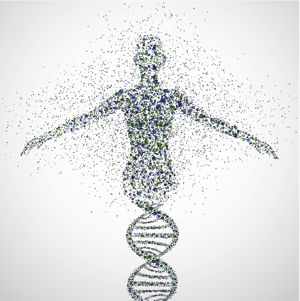Is ADHD Hereditary?

Are you concerned that if you have ADHD, you may pass it on to your children? Or, maybe your child has been diagnosed with ADHD and you wonder if you may have it as well? According to recent research, that may be the case.
While the exact causes of ADHD have not been identified, genetic studies show there is a strong hereditary component, with an up to a 91 percent likelihood of passing the disorder to your children. So what, if anything, can you do?
Genetics and ADHD … It’s complicated.
ADHD is a neurodevelopmental disorder, meaning it is brain-based. Differences in genes that structure the brain can be passed along to children. In the Time magazine article “Growing Up with ADHD,” Russell Barkley, PhD, a clinical professor of psychiatry and pediatrics at the Medical University of South Carolina in Charleston, discusses the heritability of ADHD with Denise Foley.
“There are anywhere from twenty-five to forty-five genes that are considered high-candidate genes for ADHD,” Dr. Barkley says. “But there are several we’re reliably sure of, and some of those are the genes related to dopamine regulation in the brain.”
Executive functions, behaviors, and emotions are governed by neurotransmissions in the brain. Dopamine is a key neurotransmitter, one of the chemicals our brains use to pass information between nerve cells and regulate body functions. Differences in certain genetically defined receptors may increase your likelihood of having ADHD, particularly as it relates to dopamine receptors in the brain. Low levels of dopamine are associated with inattention, mood instability, and reward and motivation deficits, common symptoms of ADHD.
Several recent studies point to differences in genes that may preclude the normal creation of dopamine receptors in brains affected by ADHD, resulting in the inability to absorb dopamine or the inability to metabolize it appropriately. Other studies show brains affected by ADHD may have changes in dopamine transporter proteins, negatively affecting levels of available dopamine.
What to do when there’s a family history of ADHD
At the moment, there is no medical test to determine whether you or your children are genetically prone toward ADHD. Diagnosis is made by a pediatrician, psychologist, psychiatrist, or other specialist following the criteria in the DSM-5. You can read more about the evaluation process at Diagnosing ADHD.
- Know your strengths. Take the time to focus on yourself in order to support your children and family. Knowing your strengths and fostering them is as important as understanding your challenges. Create structure in your family life to lessen distractions and optimize strengths. Some people have found ways to turn their ADHD symptoms to their advantage. Focus on the areas of your life where you have talents and find ways to “outsource” or delegate tasks that are difficult for you.
Finding the right treatment for you or your child
ADHD is a complex condition that is most effectively treated using a variety of tools. Working with experts and using trusted resources will help you tailor a plan that best fits your needs and those of your children.
Recent studies have also shown that exercise can increase dopamine levels, positively impact brain function and structure, and can lead to a reduction of ADHD symptoms for a short time. Aerobic exercise, a minimum of thirty minutes a day, can provide health benefits in addition to helping to reduce ADHD symptoms. Exercise can also support better sleep.
Good sleep hygiene not only supports brain function, but having a consistent routine that supports quality sleep is an important part of any family routine. Difficulty with sleep, and sleep disruption, is common in children affected by ADHD due to an overlap between the centers of the brain that regulate sleep and those that regulate attention. Creating a routine designed to help soothe and quiet the mind before bed will help promote better sleep.
Optimal treatment for ADHD includes a combination of:
- medication management
- behavioral therapy and training for both patient and parents
- education, including academic accommodations
- lifestyle supports, such as routine, coaching, and food choices
Although there is no cure for ADHD, there are options for helping you manage the disorder. Understanding your or your child’s symptoms is vital to creating an effective treatment plan. Working with your and/or your child’s specialist and other professionals will be important when making treatment decisions.
Learn more on this topic:
- The Science of ADHD
- Adult ADHD
- Parenting a Child with ADHD
- Treating ADHD
- Complementary Approaches and Lifestyle Supports
